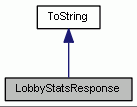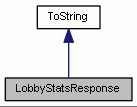 Photon C++ Client API
5.0.7.3
Photon C++ Client API
5.0.7.3
|
 Photon C++ Client API
5.0.7.3
Photon C++ Client API
5.0.7.3
|


Public Member Functions | |
| const Common::JString & | getName (void) const |
| nByte | getType (void) const |
| int | getPeerCount (void) const |
| int | getRoomCount (void) const |
| virtual Common::JString & | toString (Common::JString &retStr, bool withTypes=false) const |
| virtual JString & | toString (JString &retStr, bool withTypes=false) const=0 |
| JString | toString (bool withTypes=false) const |
 Public Member Functions inherited from ToString Public Member Functions inherited from ToString | |
| virtual | ~ToString (void) |
| virtual JString | typeToString (void) const |
| JString | toString (bool withTypes=false) const |
Passed to Listener::onLobbyStatsResponse(), Listener::onLobbyStatsUpdate(). Each instance of this class holds the name, the type and the statistics (peer count and room count) of one specific lobby. Each lobby can be uniquely identified by the combination of its name and type.
| const JString & getName | ( | void | ) | const |
| nByte getType | ( | void | ) | const |
| int getPeerCount | ( | void | ) | const |
| int getRoomCount | ( | void | ) | const |
On room creation the creator of the room can specify the name and type of the lobby to which that room gets assigned in the RoomOptions.
|
virtual |
| retStr | reference to a string, to store the return-value in; the information, which is generated by this function, will be attached at the end of any eventually existing previous content of the string |
| withTypes | set to true, to include type information in the generated string |
Implements ToString.
| toString |
| retStr | reference to a string, to store the return-value in; the information, which is generated by this function, will be attached at the end of any eventually existing previous content of the string |
| withTypes | set to true, to include type information in the generated string |
| JString toString |
This is an overloaded member function, provided for convenience. It differs from the above function only in what argument(s) it accepts.
| withTypes | set to true, to include type information in the generated string |